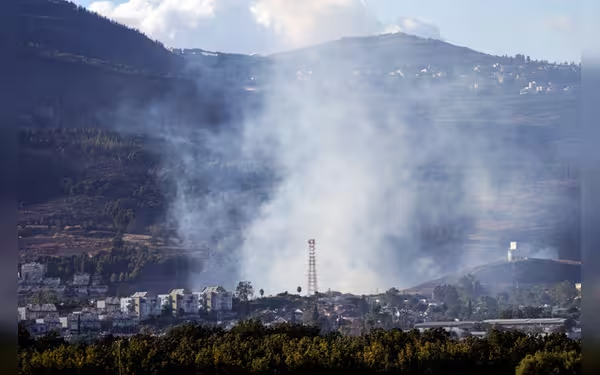Saturday, November 16, 2024 05:57 PM
Israeli Air Strikes Target Hezbollah Positions in Lebanon
- Israel conducts air strikes on Hezbollah in southern Lebanon.
- Tensions escalate following attacks on communications devices.
- Humanitarian impact grows with mass evacuations on both sides.
 Image Credits: thefrontierpost
Image Credits: thefrontierpostIsraeli air strikes target Hezbollah positions in southern Lebanon amid escalating tensions and humanitarian concerns.
In recent days, tensions have escalated significantly in the region surrounding Israel and Lebanon. The situation has become increasingly volatile following a series of military actions, particularly involving the Iranian-backed group Hezbollah. This week, Israel's military launched air strikes targeting multiple locations in southern Lebanon, marking a notable increase in hostilities.
Israeli jets and artillery struck various Hezbollah positions, including areas such as Chihine, Tayibe, Blida, Meiss El Jabal, Aitaroun, and Kfarkela. Additionally, a weapons storage facility in Khiam was also targeted. These strikes were a response to a mass attack on Hezbollah's communications devices, which has raised alarms about the potential for further conflict.
Reports indicate that some Israeli civilians have sustained injuries due to anti-tank missile fire originating from Lebanon, although official confirmation of these injuries has yet to be provided. The recent military actions come after Hezbollah launched approximately 20 projectiles into Israel, most of which were intercepted by Israeli air defense systems, preventing any casualties.
As the situation unfolds, Israeli forces have been engaged in ongoing exchanges of fire with Hezbollah, a pattern that has persisted for several months. The conflict has intensified since the October 7 attack by Hamas, which has shifted Israel's military focus towards its northern border with Lebanon.
Israeli Defence Minister Yoav Gallant has indicated that the conflict in Gaza is entering a new phase, with increased military resources being allocated to the northern border. This includes the deployment of the elite 98th Division, which comprises commando and paratroop units that have been actively involved in operations in Gaza.
Despite the ongoing exchanges of fire, both sides have so far refrained from escalating the situation into a full-scale war. However, the humanitarian impact is significant, with tens of thousands of individuals evacuated from both sides of the border. In Israel, there is growing pressure on the government to facilitate the safe return of these evacuees.
Israeli Prime Minister Benjamin Netanyahu has assured the public that efforts are being made to return evacuated citizens “securely to their homes.” As the situation continues to develop, it remains crucial for both sides to seek avenues for de-escalation to prevent further loss of life and to restore stability in the region.













